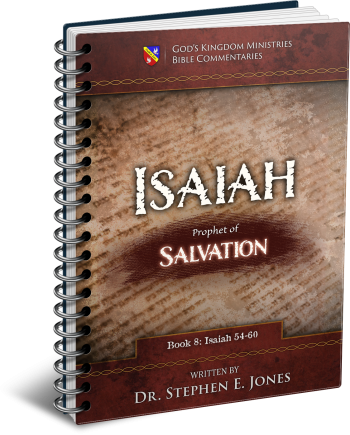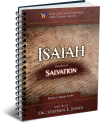Latest Posts
View the latest posts in an easy-to-read list format, with filtering options.

Isaiah is the prophet of Salvation. He is also known as the truly "Universalist" prophet, by which is meant that He makes it clear that salvation is extended equally to all nations and not just to Israel. He lived to see the fall of Israel and the deportation of the Israelites to Assyria, and he prophesied of their "return" to God (through repentance). He is truly a "major prophet" whose prophecies greatly influenced the Apostle Paul in the New Testament.
Category - Bible Commentaries

Isaiah 60:7 says,
7 All the flocks of Kedar will be gathered together to you, the rams of Nebaioth will minister to you; they will go up with acceptance on My altar, and I shall glorify My glorious house.
In addition to the wealth of nations being brought as offerings to God and to the sons of God, the prophet makes it clear that other nations too will make those offerings willingly. Kedar (in Arabia) was known for its exports of “lambs, rams, and goats” (Ezekiel 27:21) that were often used for sacrifice at the temple.
Using poetic language, the prophet describes the people of Kedar as if they themselves were the true animal sacrifices. In those days animals were sacrificed as a substitute for the one offering it. This is uniquely a New Covenant perspective, where sacrificial animals are mere types and shadows of the true Sacrifice of Christ.
God looks at the heart and the intent of the one offering the sacrifice, for He has no pleasure in the death of animals. In fact, the prophet wrote earlier, “Bring your worthless offerings no longer” (Isaiah 1:13). Hosea 6:6 echoes this sentiment, saying,
6 For I delight in loyalty [checed, “mercy, kindness, faithfulness”] rather than sacrifice, and in the knowledge of God rather than burnt offerings.
A random act of kindness coming from the altar of one’s heart is far more valuable to God than a thousand burnt offerings. The rituals of religion in themselves are nothing.
Kedar and Nebaioth were among the sons of Ishmael (Gen. 25:13). Both lived in Arabia. Nebaioth was the father of the Nabatheans in Arabia Petraea. Isaiah suggests that the day will come when these Ishmaelite brothers, representing the entire family of Ishmael, will come to the House of God as living sacrifices (Rom. 12:1) through the New Covenant. God will accept their offering, for “they will go up with acceptance on My altar.”
Thus, God says, “I shall glorify My glorious house.” The glory of God’s house is not in the great miracles of healing or fire coming down from heaven. The house of God is glorified when the people of other nations acknowledge the true God and become living sacrifices. That is how God defines the glory of His house, for this is His goal and plan for all nations.
The mind of God was already set forth earlier in Isaiah 56:7, 8,
7 Even those I will bring to My holy mountain and make them joyful in My house of prayer. Their burnt offerings will be acceptable on My altar; for My house will be called a house of prayer for all the peoples. 8 The Lord God, who gathers the dispersed of Israel, declares, “Yet others I will gather to them, to those already gathered.”
This is the glory of God, not when Israelites alone worship God, but when all nations acknowledge Him and come as living sacrifices (Rom. 12:1). God’s house is glorified by people whose hearts have turned to Him and are in agreement with His nature and law.
Isaiah 60:8, 9 says,
8 Who are these who fly like a cloud [ab, “cloud or threshold”] and like the doves [yonah] to their lattices? 9 Surely the coastlands will wait [kava, “wait, look for, hope for, expect”] for Me; and the ships of Tarshish will come first, to bring your sons from afar, their silver and their gold with them, for the name of the Lord your God, and for the Holy One of Israel, because He has glorified you.
Verse 8 is a parallelism, comparing “those who fly like a cloud” to “doves” flying “to their lattices.” The Hebrew word ab, “cloud” is also an architectural term for a threshold, or steps leading to an entryway. The word is used in this way in 1 Kings 7:6,
6 Then he made the hall of pillars; its length was 50 cubits and its width 30 cubits, and a porch was in front of them and pillars and a threshold [ab] in front of them.
Hence, Isaiah uses the double meaning of ab in verse 8 above, speaking first of a “cloud” and later about “lattices.” The parallelism compares those who fly LIKE an ab to doves flying TO an ab.
Verse 9 then explains the metaphor, where the clouds and doves represent people who are returning to God from afar. Clouds were also seen as crowds of people. Hence, Heb. 12:1 says that we are encompassed by “so great a cloud of witnesses.” Isaiah uses clouds to represent crowds of people who, like flocks of doves, are flying to the lattices of God’s house.
Narrow-minded nationalists tend to resent the presence of non-Israelites and non-Jews, seeing only the dove-poop that they bring to the house of God. But the prophet makes it clear that foreigners are welcome and that they glorify the house with their very presence.
In verse 9 the “coastlands,” or islands, wait expectantly for the Messiah. This messianic statement prophesies the coming of Christ and His gospel, which was to be preached throughout the world by the apostles. Since Israel and Judah were not islands, it implies that the gospel was to go to foreign countries.
Israel was to be included in this, of course, since they were already exiled to Assyria. More Israelites had already established various colonies throughout the Mediterranean Sea and even in Ireland, Britain, and the coasts of northern Europe. Yet when God divorced Israel (Jer. 3:8), He leveled the playing field, so to speak, by making them ex-Israelites. When Israel was divorced, they were given the same lawful status as any other nation.
So to remarry God was only possible through a New Covenant and faith in its Mediator, Jesus Christ. Faith became the requirement for all nations equally.
This is the New Covenant perspective seen throughout the book of Isaiah, where God’s house includes and welcomes the people of all nations. This is why he is known as the Prophet of Universal Salvation.
Tarshish is now called Spain. It was located at the far end of the Mediterranean Sea and thus was a metaphor for those afar off. Spain had been colonized by Israelites very early in their history. When Jonah fled from the call of God, he wanted to go as far away as he thought possible, so he took a ship going to Tarshish (Jonah 1:3). Though he never arrived there, we find a connection between Jonah and Isaiah’s prophecy about the doves returning to the house of God.
Jonah (yonah) means “dove.”
When Columbus set out from Spain to find the New World, he believed that he was fulfilling Isaiah 60:9, “the ships of Tarshish will come first to bring your sons from afar.” He did not interpret this as a return to the old land of Canaan but as the new land prophesied to King David in 2 Sam. 7:10,
10 I will also appoint a place for My people Israel and will plant them, that they may live in their own place and not be disturbed again, nor will the wicked afflict them any more as formerly.
Ultimately, this is a prophecy, not only of physical territory but of the place of God’s rest, a spiritual state of being. Nonetheless, achieving God’s rest (Jubilee) was to take a very long time, and so meanwhile God gave the Israelites lands to the west of the old land of Canaan. Note that God gave this promise to David at the height of his kingdom in the old land. The promise was of a future place (“I will also appoint a place… and will plant them”).
This foreshadowed Israel’s exile from the old land, but it also prophesied of a land inheritance somewhere other than the old land of Canaan. So when Columbus set sail on his “ships of Tarshish,” he was at least partially fulfilling the prophecy given to David.
Unfortunately, Columbus, like most of his colleagues, was carnal in his thinking. His treatment of the natives did not reflect New Covenant thinking, for instead of treating them as equals in the sight of God, he thought of them as savages to be conquered, exploited, and forced to submit to a carnal, religious hierarchy.
Further, his mandate from Queen Isabella was to find gold that would enrich Spain. Columbus interpreted Isaiah 60:9 in light of this mandate: “Their silver and their gold with them.” Instead of seeking the true wealth of spiritual gold (divine nature) and silver (redemption), he was forced to seek carnal wealth as a priority.
When he failed to bring home gold, he was imprisoned, but his trip opened the door for others to find gold and rob its owners.
The result was tragic and serves as a memorial to the destructive end of carnal, Old Covenant beliefs and religious systems.
As prospective overcomers, we should learn a lesson from this and determine never to live by Old Covenant thinking. When we study the New Covenant revelation of Isaiah, we understand that God’s emphasis was not on wealth, silver, gold, or frankincense but upon the people themselves. Metals may glorify physical temples, but the people in unity with God and the mind of Christ represent the glory of God’s true house. His house is a household of faith.
The doves, like Jonah himself, are the people who return to God, both the exiled Israelites and the “others” who gather with them around Christ (Isaiah 56:8). This gathering place is the spiritual mountain called Mount Sion, the gathering place of the sons of God.